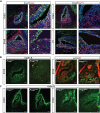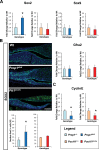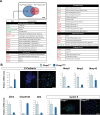PROP1 triggers epithelial-mesenchymal transition-like process in pituitary stem cells
- PMID: 27351100
- PMCID: PMC4940164
- DOI: 10.7554/eLife.14470
PROP1 triggers epithelial-mesenchymal transition-like process in pituitary stem cells
Abstract
Mutations in PROP1 are the most common cause of hypopituitarism in humans; therefore, unraveling its mechanism of action is highly relevant from a therapeutic perspective. Our current understanding of the role of PROP1 in the pituitary gland is limited to the repression and activation of the pituitary transcription factor genes Hesx1 and Pou1f1, respectively. To elucidate the comprehensive PROP1-dependent gene regulatory network, we conducted genome-wide analysis of PROP1 DNA binding and effects on gene expression in mutant mice, mouse isolated stem cells and engineered mouse cell lines. We determined that PROP1 is essential for stimulating stem cells to undergo an epithelial to mesenchymal transition-like process necessary for cell migration and differentiation. Genomic profiling reveals that PROP1 binds to genes expressed in epithelial cells like Claudin 23, and to EMT inducer genes like Zeb2, Notch2 and Gli2. Zeb2 activation appears to be a key step in the EMT process. Our findings identify PROP1 as a central transcriptional component of pituitary stem cell differentiation.
Keywords: cell biology; developmental biology; differentiation; hypopituitarism; mouse; pituitary; stem cells.
Conflict of interest statement
The authors declare that no competing interests exist.
Figures














Comment in
-
Pituitary gland: Understanding pituitary development.Nat Rev Endocrinol. 2016 Sep;12(9):497. doi: 10.1038/nrendo.2016.117. Epub 2016 Jul 15. Nat Rev Endocrinol. 2016. PMID: 27418022 No abstract available.
Similar articles
-
Pituitary Stem Cell Regulation by Zeb2 and BMP Signaling.Endocrinology. 2023 Jan 9;164(3):bqad016. doi: 10.1210/endocr/bqad016. Endocrinology. 2023. PMID: 36683433 Free PMC article.
-
Role of PROP1 in Postnatal Pituitary Gland Maturation.Endocrinology. 2025 Jul 8;166(9):bqaf047. doi: 10.1210/endocr/bqaf047. Endocrinology. 2025. PMID: 40048699
-
All Hormone-Producing Cell Types of the Pituitary Intermediate and Anterior Lobes Derive From Prop1-Expressing Progenitors.Endocrinology. 2016 Apr;157(4):1385-96. doi: 10.1210/en.2015-1862. Epub 2016 Jan 26. Endocrinology. 2016. PMID: 26812162 Free PMC article.
-
Regulation of pituitary stem cells by epithelial to mesenchymal transition events and signaling pathways.Mol Cell Endocrinol. 2017 Apr 15;445:14-26. doi: 10.1016/j.mce.2016.09.016. Epub 2016 Sep 17. Mol Cell Endocrinol. 2017. PMID: 27650955 Free PMC article. Review.
-
LHX3 and LHX4 transcription factors in pituitary development and disease.Pediatr Endocrinol Rev. 2009 Jan;6 Suppl 2:283-90. Pediatr Endocrinol Rev. 2009. PMID: 19337183 Review.
Cited by
-
Gut bacteria induce IgA expression in pituitary hormone-secreting cells during aging.iScience. 2023 Aug 26;26(10):107747. doi: 10.1016/j.isci.2023.107747. eCollection 2023 Oct 20. iScience. 2023. PMID: 37692284 Free PMC article.
-
Pituitary Remodeling Throughout Life: Are Resident Stem Cells Involved?Front Endocrinol (Lausanne). 2021 Jan 29;11:604519. doi: 10.3389/fendo.2020.604519. eCollection 2020. Front Endocrinol (Lausanne). 2021. PMID: 33584539 Free PMC article. Review.
-
NOTCH activity differentially affects alternative cell fate acquisition and maintenance.Elife. 2018 Mar 26;7:e33318. doi: 10.7554/eLife.33318. Elife. 2018. PMID: 29578405 Free PMC article.
-
A Potential Concomitant Sellar Embryonic Remnant-Associated Collision Tumor: Systematic Review.Front Oncol. 2021 Apr 29;11:649958. doi: 10.3389/fonc.2021.649958. eCollection 2021. Front Oncol. 2021. PMID: 33996567 Free PMC article.
-
Pituitary Stem Cell Regulation by Zeb2 and BMP Signaling.Endocrinology. 2023 Jan 9;164(3):bqad016. doi: 10.1210/endocr/bqad016. Endocrinology. 2023. PMID: 36683433 Free PMC article.
References
-
- Andoniadou CL, Matsushima D, Mousavy Gharavy SN, Signore M, Mackintosh AI, Schaeffer M, Gaston-Massuet C, Mollard P, Jacques TS, Le Tissier P, Dattani MT, Pevny LH, Martinez-Barbera JP. Sox2(+) stem/progenitor cells in the adult mouse pituitary support organ homeostasis and have tumor-inducing potential. Cell Stem Cell. 2013;13:433–445. doi: 10.1016/j.stem.2013.07.004. - DOI - PubMed
-
- Bilodeau S, Roussel-Gervais A, Drouin J. Distinct developmental roles of cell cycle inhibitors p57Kip2 and p27Kip1 distinguish pituitary progenitor cell cycle exit from cell cycle reentry of differentiated cells. Molecular and Cellular Biology. 2009;29:1895–1908. doi: 10.1128/MCB.01885-08. - DOI - PMC - PubMed
-
- Böttner A, Keller E, Kratzsch J, Stobbe H, Weigel JF, Keller A, Hirsch W, Kiess W, Blum WF, Pfäffle RW. PROP1 mutations cause progressive deterioration of anterior pituitary function including adrenal insufficiency: a longitudinal analysis. Journal of Clinical Endocrinology & Metabolism. 2004;89:5256–5265. doi: 10.1210/jc.2004-0661. - DOI - PubMed
Publication types
MeSH terms
Substances
Grants and funding
LinkOut - more resources
Full Text Sources
Other Literature Sources
Medical
Molecular Biology Databases
Research Materials
Miscellaneous

